What are Credit Scores?
Credit scores are a rating that lenders use to determine a potential borrower’s creditworthiness quickly. It predicts the likelihood an individual will repay a loan on time and in full.
Most credit scores are a three-digit number, and credit scores typically range from 300-850. The higher the credit score, the more creditworthy. High credit scores open the door to more loan options, higher credit limits, lower interest rates, and more favorable credit terms. Lower credit scores mean fewer financing options, higher interest rates, and less favorable terms.
Lenders and financial services companies use credit scores to make billions of dollars in credit decisions every day. Your credit score is a major determining factor for personal and business loans.
Examples of personal financing products include installment loans, revolving credit accounts, consumer credit accounts, and mortgages. Business loan products include business term loans, lines of credit, equipment financing, and more. Business lenders also consider your business credit score.
Credit bureaus provide credit reports and use the information in your credit report to calculate your credit score. The three major credit bureaus are Experian, Equifax, and TransUnion.
What are Credit Score Ranges?
Credit score ranges are a scale used to determine creditworthiness depending on where your score falls. Ranges vary by credit score type.
FICO Score Ranges
The most widely used credit score is the FICO® score. The Fair Isaac Corporation introduced the FICO credit score in 1989 before it became FICO. Over 90% of the top lenders use the FICO score in credit decisions.
FICO scores range from 300-850. In 2022, the average FICO score in the US was 714.
The breakdown of the FICO score range is as follows:
- Excellent: 800-850.
- Very good: 740-799.
- Good: 670-739.
- Fair: 580-669.
- Poor: 300-579.
VantageScore Ranges
The three major credit bureaus developed the VantageScore® in 2006 to standardize consumer credit scores. FICO scores vary by credit bureau because each company uses its own credit report to calculate the score. However, VantageScores are the same at all three major bureaus.
The first two credit scoring models for VantageScore credit scores provided a range between 501 to 990. However, the most recent credit scoring models, VantageScore 3 and VantageScore 4, use a range of 300 to 850, the same as FICO scores.
The average credit score differs for each credit scoring model. The average VantageScore was 695 in 2022.
The breakdown of VantageScore ranges is as follows:
- Excellent: 781-850.
- Good: 661-780.
- Fair: 601-600.
- Poor: 500-600.
- Very poor: 300-499.
Business Credit Score Ranges
As a small business owner, you must also track your business credit scores. However, business credit scores work differently than consumer credit scores. As a result, business credit score ranges are more complicated.
See our essential guide on business credit scores for more information.
How are Credit Scores determined?
Your credit score is based on the information in your credit report, which includes your open accounts, loan history, credit usage, payment history, and more. While FICO and VantageScore provide different credit scores, they use many of the same factors when calculating scores. However, they weigh them differently.
Since FICO is the primary credit scoring model, we’ll use its credit range factors. Each factor comprises a percentage of your credit score:
- Payment history: 35%.
- Credit utilization: 30%.
- Credit history: 15%.
- Credit mix: 10%.
- New credit: 10%.
Payment History
This category measures your track record of paying bills. It accounts for any late payments and how late they were. On-time payments will gradually raise your score over time. Late payments, and defaults, can quickly lower your score.
Credit Utilization
Your credit usage, or utilization, is your current debt burden. This measure uses the credit utilization rate, the percentage of your existing debt over your available credit. For example, if you have a credit limit of $10,000 and have $2,000 in credit card debt ($2,000/$10,000), your utilization ratio is 20%. A credit utilization ratio over 30% will negatively impact your credit score. People with excellent credit scores tend to have credit usage rates in the single digits.
Account history
This refers to how long your accounts have been active. It’s sometimes called credit history, length of credit history, or “time in file.” The longer an account is open, the more positive impact it has on your credit score. Most credit reporting agencies use an average account history length.
For example, if you have three accounts, one open for 10 years, one open for 6 years, and one open for 5 years, you’d take the sum (21) and divide it by the number of accounts (3), to get at an average account history of 7 years. Most accounts five years or older help build credit. A FICO study revealed that people with a credit score in the 800-850 range have an average account history of 128 months (a little over 10.5 years).
Credit mix
Successfully managing different types of credit can help improve a credit score. Types of credit include installment loans, revolving credit such as credit card accounts, consumer credit, and mortgages.
New credit
Applying to open a new credit account results in a hard credit inquiry, which can lower your credit score. You should avoid opening too many accounts simultaneously to avoid too many hard credit pulls.
Credit Report Information That Doesn’t Impact Credit Scores
Credit reports also include personal identification information (PII) and demographic information. This information doesn’t factor into credit score calculations. It primarily verifies your identity and tracks credit score information by demographics.
Information that doesn’t impact your credit score includes the following:
- Your race, color, religion, national origin, sex, or marital status.
- Your age.
- Employment, including where your work, salary, hiring date, and employment history.
- Where you live or previous addresses.
- Soft credit inquiries.
What’s a Good Credit Score Range?
There is no definitive cutoff between a good and bad credit score. That’s why credit score ranges help assess if your score is good or bad. The highest credit score you can get is 850, but there’s not much difference between perfect and excellent scores. People with excellent credit (800-850) generally have access to the same loan or credit card options.
Generally, most FICO scores over 670 are considered “good.” However, some lenders are more stringent than others and might only consider scores over 700 to be a good credit range. This is especially true when pursuing a conventional business loan from a traditional lender, like a bank or credit union. On the other hand, alternative business lenders often have much lower thresholds for a good credit score.
To help put it into perspective, we’ll focus on the role of credit in mortgages, as that’s one of the most significant concerns in credit management.
Most mortgage lenders require a minimum credit score of 620 for a conventional mortgage loan. Some require a minimum of 670. Your credit score will also determine your interest rate. You’ll need a credit score over 740 for the lowest available mortgage rates.
What’s a Bad Credit Score Range?
When thinking about “bad credit scores,” there are two ways of looking at it. Lower credit scores, typically in the fair credit score range or the upper end of the poor range, limit what lending products are available and lead to higher interest rates and fees. Scores at the lower end of the poor credit score range limit your options even more.
Again, sticking with mortgages as an example, there are several lending mortgage programs designed to help low-credit borrowers. The most widely known is the government-back mortgage program, FHA loans.
Borrowers need a minimum credit score of 500 with a 10% down payment for an FHA loan. If only putting down 3.5%, borrowers need a minimum credit score of 580.
USDA loans don’t have a minimum credit score requirement, but most lenders require a minimum of 580. VA loans require a minimum credit score of 620.
As you can see, credit scores below 500 significantly lower your access to loans, even for programs designed to help low-credit borrowers. Similarly, the most accessible small business loans, merchant cash advances (MCAs), often have a minimum credit score cutoff of 450-500.
Why are Credit Score Ranges important?
Credit scores are a significant determining factor when you need to borrow money. Examples include mortgages, auto loans, rental or car leases, personal loans, and small business loans. It’s a vital part of managing personal finance decisions.
Lenders always consider their risk level when reviewing a loan request. A high credit score means low risk, while a low credit score means high risk. Many lenders have a minimum credit score requirement, which is their cutoff for eligible borrowers.
Your credit score directly impacts your approval and the interest rate you receive. Bad credit borrowers might have to get a cosigner, make a larger down payment, or put up more collateral to offset their credit risk level.
Some utility companies might also review your credit history to see if you must make a down payment. Auto insurance companies often consider your credit score as one of their risk factors when determining your premium.
It can also impact employment. An employer might look at an applicant’s credit score to assess reliability.
Does my Credit Score Range impact Small Business Loans?
Your personal credit score range plays a role in business loans as well. Commercial lenders look at a small business owner’s personal credit score and the business’s credit score. A personal credit score is weighed more heavily for sole proprietors or younger businesses that haven’t established business credit.
As with consumer financing, a higher credit score range means more loan options, higher approval rates, and lower interest rates. A lower score range means fewer options, lower approval rates, and higher interest rates.
Small business owners must know their credit ranges and financial health before applying for a business loan. If you have a poor credit score, you might want to take steps to boost your credit score before applying.
Frequently Asked Questions
Here are the most common questions about credit score ranges.
Where can I get my credit scores?
There are multiple ways to access your scores. Several financial companies, such as banks, credit card issuers, auto loan providers, or mortgage lenders, might offer free credit scores and monitoring as part of your account services. Others let you opt into credit score monitoring for a fee.
You can also create an account with one or all three major credit bureaus. Each provides a free account that provides your credit report and baseline scores. You can opt into paid accounts that provide additional services such as freezing or locking your credit profile, identity theft protection, viewing different versions of your score, and seeing your scores at the other bureaus.
All individuals also get access to one free credit report per year. However, that credit report does not include a free credit score. Even so, you can check your annual credit report for adverse reports (late payments, defaults, etc.), incorrect information, or other factors that could impact your score.
You can also try to remove information in some cases. For example, let’s say you have a positive payment history with a company, but one late payment report from a few years ago is on the report. You can contact the creditor to see if they’ll remove the late payment report.
You can access your free yearly credit report at www.AnnualCreditReport.com.
Business Credit Report
Unlike personal credit reports, which have privacy protections under the FCRA, business credit reports are publicly available information. You can visit the major business credit bureaus to access your report.
How can I Improve my Credit Score if I have Bad Credit?
You can take the following actions to boost your credit score:
Pay down debt
Credit utilization refers to the percentage of your available credit you’re currently using. Credit utilization below 30% is considered ideal. If your utilization is higher than that, paying down your debt to get below 30% can quickly improve your score. You can also try opening new credit accounts to increase your available limit but be careful, as too many new accounts can temporarily hurt your credit score.
On-Time Payments
Making your payments on time and in full helps build and improve credit. Ensure you don’t miss any payments before applying for a business loan. If your report shows late payments, but you’re currently caught up, you can try contacting the financial company to see if they’ll remove the late payment from your report.
Keep Credit Accounts Open
The age of your credit accounts makes up 15% of your credit score. Don’t close any of your older accounts before applying for new credit.
Maintain Credit Variety
Various types of credit, including credit cards or other revolving credit accounts, personal loans, auto loans, mortgage loans, etc., also help improve credit. Again though, be careful opening new accounts.
Are there Business Loans for Bad Credit?
Yes, there are business loans for bad credit. You’ll sometimes see these listed as “bad credit business loans” or “business loans with bad credit.”
However, getting a business loan with bad credit is more challenging. You’ll likely have to apply to an alternative online lender or marketplace, like UCS. Traditional lenders like banks and credit unions usually won’t issue a bad credit business loan.
In addition to having fewer loan options, small business loans for bad credit usually have lower credit limits, higher interest rates, additional fees, shorter terms, and frequent payments. One way to think of a business loan for bad credit is as a form of bridge financing.
Bad credit business loans can provide short-term financing to help support operations. Your credit could improve as you repay the loan and grow the business. Once you have a better credit score, a longer time in business, and higher revenue, you can qualify for a longer-term, lower-cost loan. In some cases, you can use the long-term loan funds to pay off the bad credit business loan.
See our Best Business Loans for Bad Credit essential guide for more information.
Bad Credit Business Loan Pros & Cons
Pros:
- Accessible financing for borrowers with a low credit score.
- Could potentially help build or repair credit with timely payments.
- Might be able to use the funds to pay off existing debt.
- Quick and easy online applications.
- Usually fast approval and funding times.
Cons:
- Higher interest rates & fees than conventional loans.
- Lower borrowing amounts than traditional business loans.
- Typically short-term financing with frequent repayments.
- Might require collateral or a personal guarantee.
- Could require automatic payment withdrawals.
- Fewer options for lenders and loan types.
What’s a Credit Score Range – Final Thoughts
Knowing your credit score is good, but understanding credit score ranges lets you know where your score falls. An excellent credit score helps with personal financing, such as a mortgage or car loan and business loans.
However, a poor score limits your financing options and leads to higher interest payments. Ensure you make on-time payments, keep credit card balances under 30%, and maintain several types of credit to help improve your credit score.
Contact us if you have more questions about credit score ranges to apply for a small business loan. Our funding experts can help you find the best business loan for your score range.



















